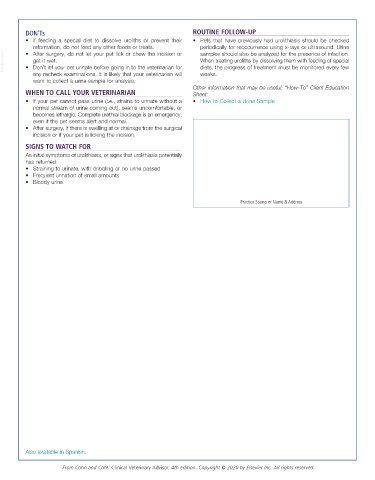Page 3142 - Cote clinical veterinary advisor dogs and cats 4th
P. 3142
DON’Ts ROUTINE FOLLOW-UP
• If feeding a special diet to dissolve uroliths or prevent their • Pets that have previously had urolithiasis should be checked
reformation, do not feed any other foods or treats. periodically for reoccurrence using x-rays or ultrasound. Urine
VetBooks.ir • Don’t let your pet urinate before going in to the veterinarian for When treating uroliths by dissolving them with feeding of special
samples should also be analyzed for the presence of infection.
• After surgery, do not let your pet lick or chew the incision or
get it wet.
diets, the progress of treatment must be monitored every few
any recheck examinations. It is likely that your veterinarian will weeks.
want to collect a urine sample for analysis.
Other information that may be useful: “How-To” Client Education
WHEN TO CALL YOUR VETERINARIAN Sheet:
• If your pet cannot pass urine (i.e., strains to urinate without a • How to Collect a Urine Sample
normal stream of urine coming out), seems uncomfortable, or
becomes lethargic. Complete urethral blockage is an emergency,
even if the pet seems alert and normal.
• After surgery, if there is swelling at or drainage from the surgical
incision or if your pet is licking the incision.
SIGNS TO WATCH FOR
As initial symptoms of urolithiasis, or signs that urolithiasis potentially
has returned:
• Straining to urinate, with dribbling or no urine passed
• Frequent urination of small amounts
• Bloody urine
Practice Stamp or Name & Address
Also available in Spanish.
From Cohn and Côté: Clinical Veterinary Advisor, 4th edition. Copyright © 2020 by Elsevier Inc. All rights reserved.

